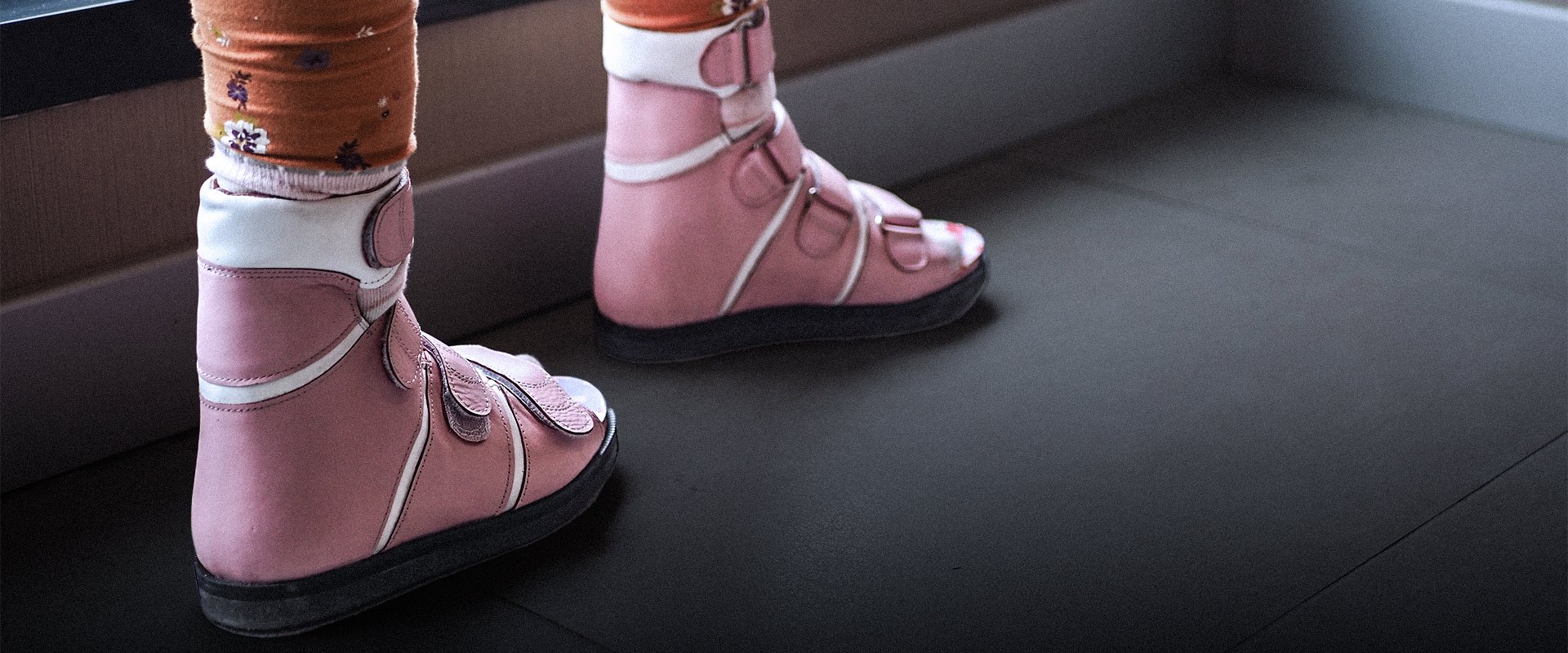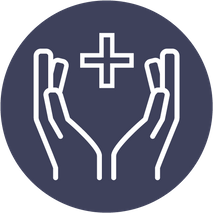
Physical Therapy for Cerebral Palsy
AT EVOLVE
Physical Therapy for Cerebral Palsy
HOW CAN PHYSICAL THERAPY HELP CEREBRAL PALSY?
Cerebral Palsy (CP) is an acquired neurodevelopmental condition that appears at birth or early in childhood and is caused by an injury to or an abnormality in the developing brain. Children and adults with cerebral palsy often present with differences in their nervous and musculoskeletal systems that can impact their ability to sit, stand, walk, crawl, run, and perform daily tasks. Physical therapy plays an important role in maximizing function and independence for children and adults with cerebral palsy.
WHAT DOES PHYSICAL THERAPY FOR CEREBRAL PALSY LOOK LIKE?
While every case of CP is different, my staff and I will apply the best, evidence-based techniques to address your or your family member’s pain and functional limitations. We will start with an initial evaluation to better understand the pattern of symptoms you or your family member are experiencing and how cerebral palsy is affecting you or your family member’s daily life. We will discuss your goals for physical therapy and perform an examination to assess relevant body structures and function. With all of this knowledge in hand, we will create a custom program that may consist of hands-on techniques performed by our therapists combined with carefully prescribed movements and exercises performed by you or your family member in the clinic and at home.
HOW LONG WILL I NEED PHYSICAL THERAPY?
As CP is a chronic condition, how long and how often you work with a physical therapist can be quite variable and is based on the reason you are seeking care. PT to address an acute symptom that is new, may require a shorter course of therapy, such as 4-6 weeks while a more chronic impairment or desire to restore previously-mastered or acquire not-yet-mastered functional skills may require a longer course of care. After the initial evaluation your therapist will discuss with you the planned duration of your care and regular reassessment is used to evaluate your response to therapy and determine an appropriate discharge date.
WHAT IS CEREBRAL PALSY?
Cerebral Palsy (CP) is the leading cause of childhood disability in the United States. It is a permanent and acquired neurodevelopmental condition that affects the central nervous system. CP may be the result of an abnormality in fetal brain development or may be acquired due to brain injury before, during or after birth and is irreversible. CP is not progressive, however, meaning the condition itself does not worsen, though symptoms or impairments may have a greater impact on an individual as they grow and age. Some individuals with CP may experience only minor signs and symptoms and will carry out an independent life and career while others may require part or full-time caregiver support.
There are several types of CP and each is named by the location of symptoms and the dominant movement type. The term diplegia is used to describe symptoms that occur more so in the legs than the arms. Quadriplegia indicates all four limbs are affected whereas hemiplegia indicates one half of the body (right or left side) is affected. Types of CP are further classified by their primary movement pattern:
- Spastic CP: caused by injury to or abnormal development of the motor cortex of the brain. Causes spasticity or abnormal tightness in the muscles which affects voluntary movement.
- Dyskinetic CP: also known as “athetoid CP,” is caused by damage to or abnormal development of the basal ganglia area of the brain. It is characterized by involuntary and often writhing movements.
- Ataxic CP: caused by injury to or abnormal development of the cerebellum which causes shaky movements in the head, trunk or extremities and can impact balance and coordination.
- Mixed CP: a mixture of the above movement patterns is experienced due to injury to or abnormal development of multiple areas of the brain.
- Spastic, dyskinetic or ataxic movements of the head, trunk and extremities
- Changes in muscle length, joint range of motion or contractures
- Weakness in one or more limbs or the neck or trunk
- Difficulty coordinating movement of the limbs for tasks like walking, changing positions, feeding oneself, writing and more
- Impaired posture
- Impaired balance
- Pain
- A need for assistance with self-care, mobility and activities of daily living
- Delays in the acquisition of gross and fine motor skills and language
- Seizures
- Intellectual disability
- Incontinence
- Impaired vision
- Impaired hearing
- Impaired growth and development
- Dental problems
- Social emotional impacts
- Reduced bone health
End Injury Progression
Physical therapy for CP has proven to prevent injury, slow and even stop pain issues, improve performance, and slow CP progression in many cases.
Relieve Pain
The movements used in this technique can target your entire body helping you to manage discomfort and pain during the course of your physical therapy treatments.
Improve Range of Motion
Posture awareness is an important area to focus on due to the fact that certain positions may cause you further discomfort and pain.
Restore Mobility
You can regain mobility and flexibility by taking part in the stretches and exercises as prescribed by your physical therapist.
How Long Will Physical Therapy for Cerebral Palsy Last?
If you decide to work with a physical therapist to help with cerebral palsy issues, your entire treatment plan could consist of around 8-20+ different physical therapy sessions to start that will each last 60-90 minutes. Once you complete your customized physical therapy treatment plan, you will be able to continue to do the prescribed stretches and exercises utilized during your PT sessions yet in the comfort of your own home.
ROLE OF PHYSICAL THERAPY IN MANAGING CP
Children and adults with CP will often benefit from physical therapy throughout their lifetime as the impairments and symptoms of CP will impact them differently throughout their life. Children 0-3yo will often qualify for PT through Early Intervention followed by either privately funded or state funded therapy until 21 years old. Even as adults many with CP can benefit from working with a physical therapist intermittently. Some of the goals of physical therapy for children, teens and adults with cerebral palsy include:
- Reduce sensations of pain and discomfort
- Maintain or improve joint and muscle flexibility
- Improve posture
- Acquire equipment and orthotics
- Increase overall health and fitness through physical activity such as aerobic, strength, endurance, balance and flexibility training
- Preserve or improve the ability to sit, stand and move about
- Preserve or improve the ability to participate in daily activities at home and in the community
- Acquire age-appropriate gross and fine motor skills
- Improve balance
If you or your loved one have cerebral palsy, having a great physical therapist on your team is a lifelong benefit. The physical therapists at Evolve Physical Therapy are here to help you reach your goals. Call to schedule an evaluation today. Call to Schedule a Consultation! 1-718-258-3300
Mill Basin (located in Harbor Fitness)
6161 Strickland Ave
Brooklyn, NY 11234
Monday: 7am-8pm
Tuesday: 7am-8pm
Wednesday: 8am-5pm
Thursday: 7am-8pm
Friday: 8am-1pm
Park Slope (located in Harbor Fitness)
550 5th Ave.
Brooklyn, NY 11215
Monday: 9am-8pm
Tuesday: 8am-6pm
Wednesday: 9am-8pm
Thursday: 8am-6pm
Friday: 8am-3pm
Gravesend
372 Avenue U
Brooklyn, NY 11223
Monday-Thursday: 8am-8pm
Friday: 8am-3pm
Ready to take the next step to a healthier you?
Contact Us Today!
PHYSICAL THERAPY FOR CEREBRAL PALSY !
Need physical therapy for Cerebral Palsy?
Let our caring and compassionate physical therapists help you with relieving pain while getting you back on your feet comfortably.
Call now to schedule your first PT consultation free of charge.
Call: 1-718-258-3300







